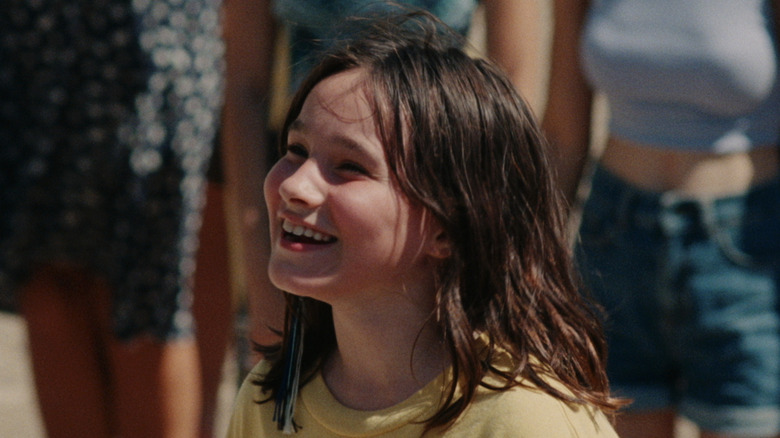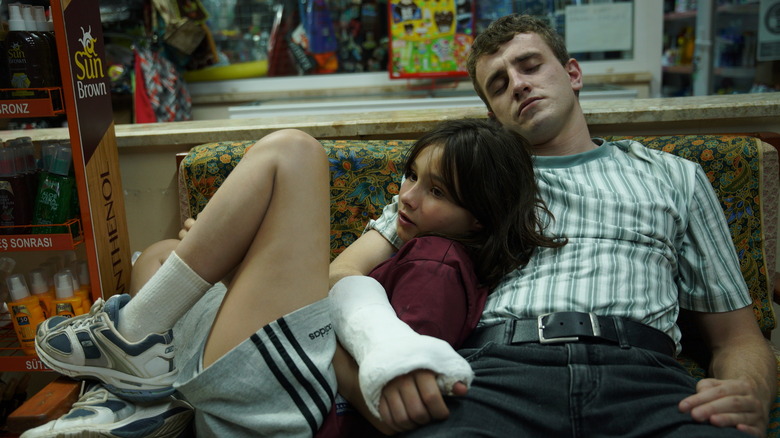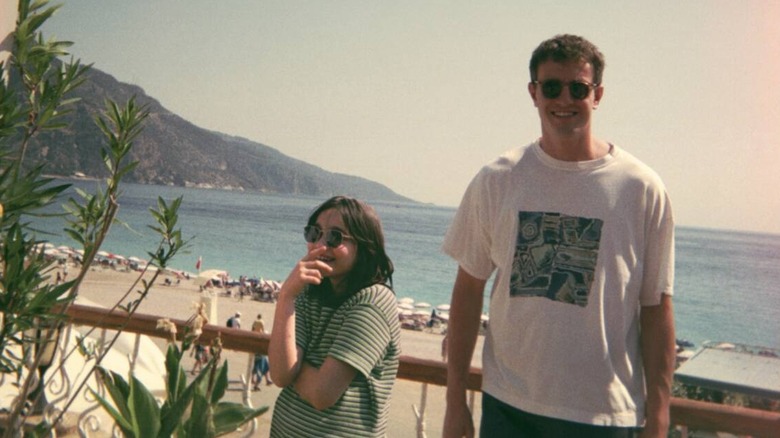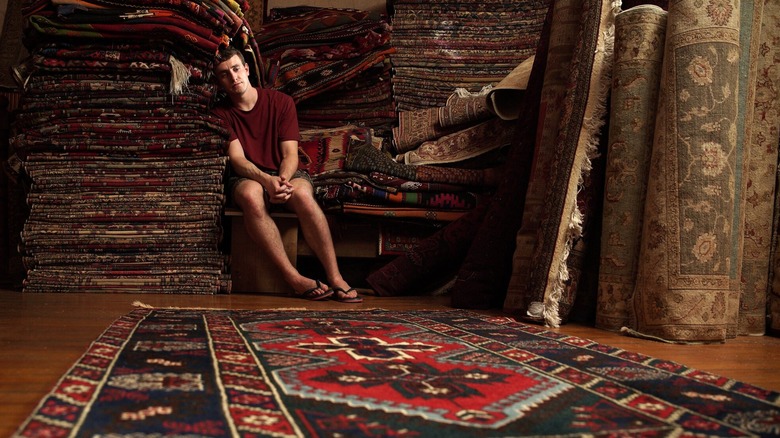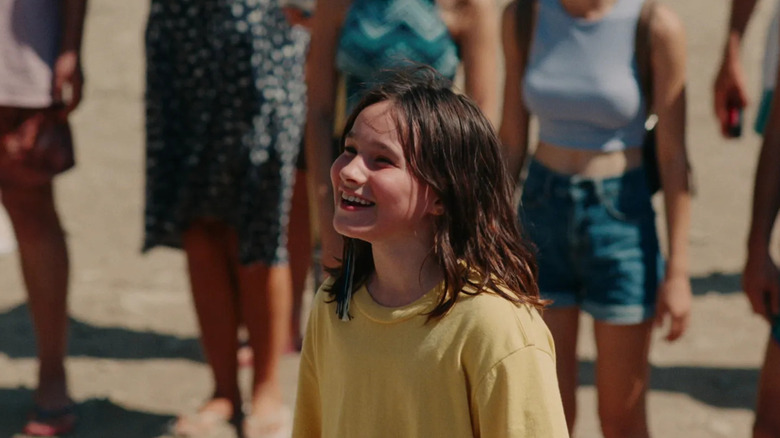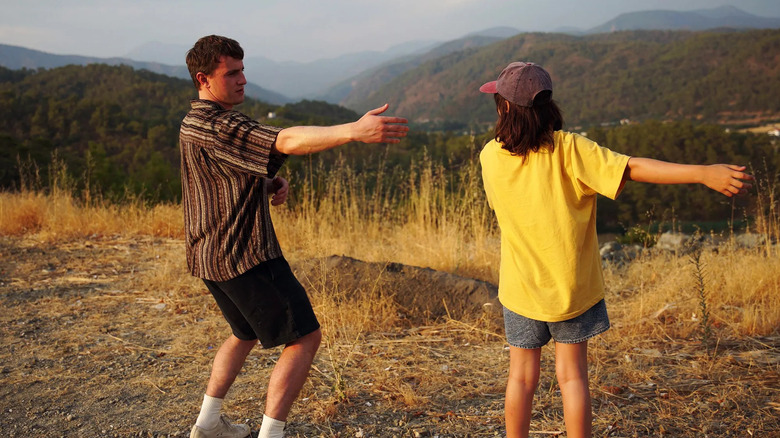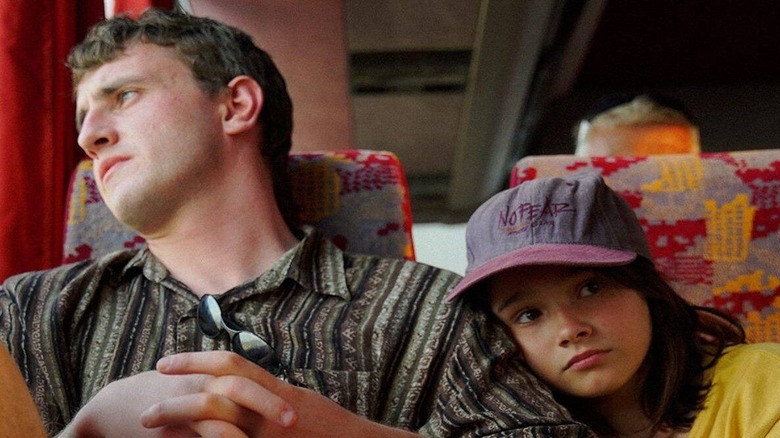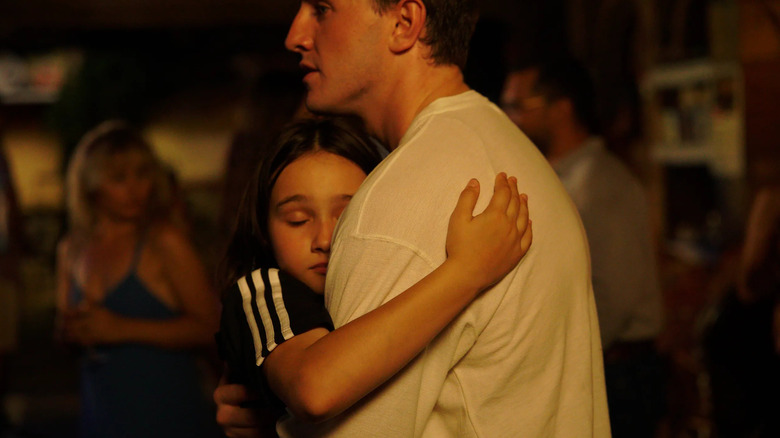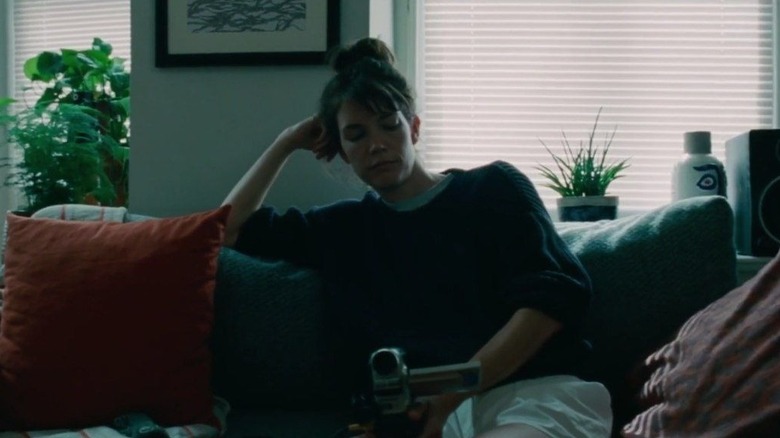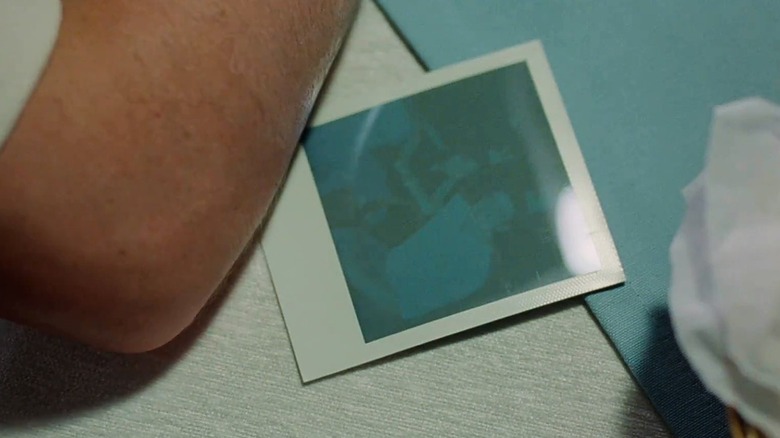The Ending Of Aftersun Explained
The following article discusses depression and suicide. If you or anyone you know is having suicidal thoughts, please contact the National Suicide Prevention Lifeline by dialing 988 or by calling 1-800-273-TALK (8255).
"Aftersun" was one of the breakout hits of the 2022 festival circuit. The turn-of-the-millennium period piece about a young father and his tween daughter spending time at a Turkish resort was made by Charlotte Wells on a minuscule budget with a grant from Scotland's Film Production and Development Fund. Critics were incredibly impressed, with the New York Times' A.O. Scott boldly claiming that Wells was "very nearly reinventing the language of film" — quite a compliment for a first-time writer-director working with a child actor and a budget of barely £350,000. This humble film's success portends big things for both Wells and its stars, Paul Mescal and Frankie Corio. Wells has racked up awards for the best first film, Corio has been repeatedly singled out for her breakthrough performance, and Mescal appears to have nabbed the coveted lead role in "Gladiator 2."
For all the deserved attention it's been getting, "Aftersun" is a difficult film to unpack, easier to relate to than it is to understand. In an interview with Variety, Wells called her debut feature "not autobiographical, per se," but that she sees some of herself within both of the film's main characters. She admits that the project started out with a traditional narrative, but the final product is more impressionistic, and all the better for it. As such, it can be interpreted in myriad ways, which is part of its appeal. These are the questions that Wells asks and sort-of answers with "Aftersun."
What's Sophie and Calum's relationship like?
"Aftersun" opens with a brief video recording from inside Sophie and Calum's hotel room (we'll see the second half of the clip about halfway through). She narrates that she's recently turned 11, and she jokes that her dad is 130 and about to turn 131. If we do the math, we can figure out that Calum was just 19 when Sophie was born and was probably ill-suited for fatherhood at that time. The way they interact with each other — kindly and easily but with some distance — indicates that they get along just fine, but that they don't see each other regularly, and that Sophie doesn't really consider her father to be an authority figure. When they play pool with two teenage boys, they're mistaken for brother and sister. That Sophie and Calum are, in some ways, closer to being equals than guardian and child is something that "Aftersun" wants to explore.
Though we never find out specific details about Calum and Sophie's mother's history (just as we don't find out many details about their lives in general), we can deduce that Sophie's parents split years ago. During a check-in phone call with his ex (who clearly still worries about him), Calum says he's happy for her. He also tells her that he loves her, which confuses Sophie. Her mother and father either split amicably or are at least friendly at the moment, though it appears that she has moved on to a new relationship. But it's also possible that Calum still has feelings for her. He explains to Sophie that they'll always be family, even though they live apart.
Why is so much of Aftersun shot on home video?
Wells uses different perspectives to tell the story of "Aftersun" — as much as there is one. Some of what we see is meant to approximate objective truth in the form of establishing shots and back-and-forth conversations. Other scenes — especially what seem like abstract images from random angles — are meant to serve more as a record of what 11-year-old Sophie observes and remembers. Some brief sequences are recorded and shown to the viewer through Calum's digital video camera. These are the moments that young Sophie and Calum intentionally chose to capture.
Plenty of movies have used home movies as a narrative device. Often, these clips contain clues to a major narrative development, as we see in Spielberg's "The Fabelmans." But "Aftersun" doesn't fit together like a puzzle the way more straightforward stories do. Wells is far more interested in perception and memory than plot. The film is a representation of how adult Sophie remembers that week from her childhood. Some of it she knows as fact. For example, she went to Turkey with her dad. There was a pool. She slept in the big bed. Some of it lives in her mind as an emotional memory, like when she overhears teen girls talking in the bathroom. What's recorded on the camera she can literally revisit. Sophie didn't fully comprehend what was going on with her father then, as no child can. But with her memories, those recordings, and the hindsight of age, she can piece together some semblance of the truth.
What's gone wrong in Calum's life?
We can glean bits and pieces of Calum's backstory from his chats with Sophie and from some of his behaviors and choices. During one of their talks, Calum confesses to Sophie that the woman he'd been dating (and presumably living with) has gone back to her former boyfriend. Sophie is sad on her dad's behalf. She liked his girlfriend, and she asks whether that means he won't be opening a cafe after all. He confirms it does. It seems as though just prior to the trip, Calum's long-term relationship ended and left him not only emotionally sapped but financially drained and with fewer prospects. He tries to sound upbeat for his daughter's sake and tells her that he plans to rent a house with his friend Keith where he can work from home and she can have her own room. Sophie keeps things lighthearted and is supportive, but it's clear that she doesn't entirely believe this plan will work out.
There are indications all throughout "Aftersun" that money's extremely tight for Calum (they don't have all-inclusive wristbands, he smokes used cigarettes, and they dine and dash), but there are also reasons to think he brings those money problems on himself. He doesn't think twice about splurging on alcohol, and he sneaks out to buy an expensive Turkish rug that he can't afford. His break-up, lack of employment, drinking, and poor budgeting are more realistically symptoms of Calum's legitimate mental health struggles as opposed to the cause.
What's Sophie's experience of the vacation?
For her part, tween Sophie is on vacation to have fun and to figure herself out while under the less strict supervision of her dad. She strikes up a friendship with a boy her own age who she meets playing arcade games. Though he's nice enough to her in many respects (he offers her quarters when it's clear she can't afford to play), he's also a pubescent metaphor for some groan-worthy male behaviors, mansplaining the games to her and jokingly attacking her from behind. He's genuinely attracted to Sophie, but she regards him with something more like curiosity than affection, even when she kisses him back. Tellingly, Sophie's in a romantic relationship with a woman in the present day, though Wells doesn't draw a straight line between the teen girls' advice that "boys are gross" and adult Sophie's sexuality.
Of more interest to Sophie are those teenagers who dismiss her at first, but eventually include her in their poolside socializing. She eavesdrops on girls talking about foreplay and their looks, then stares at herself in the bathroom mirror, trying to figure out how grown up and feminine she's supposed to be. When she plays water polo with her dad, the teens, and the other resort guests, she's literally adrift in a sea of adults and no one will give her the ball. Sophie spends much of the trip studying the teens and her father as if they're animals in the wild, so that she might be better prepared for whatever phase of life comes next.
Does she know that her dad's depressed?
"Aftersun" is primarily about how Sophie is only able to grasp how formative the trip to Turkey with her father was with the benefit of hindsight — but that doesn't mean she was completely oblivious. Young Sophie is mature and insightful for her age, and it's in the moments when she confronts Calum most directly that he pulls away or falls apart. When she calls her mom, she reports back about how he's doing as if this is a common topic of conversation for them. She thinks the "slow ninja moves" he does and the self-help books he reads are weird, yet she understands that they're a coping mechanism. When she drops the scuba mask, she's deeply apologetic, because she knows about his money troubles.
Mostly, Sophie's accommodating when it comes to her father's shortcomings. Even when he passes out, she tells him it's not a big deal. But on occasion, she's frustrated by how unreliable and unknowable he is. If he's in a good mood, he wants to go out or dance, and she obliges. But if he's in a bad mood, as he is when she wants to do karaoke, she's on her own. Sophie sings a slightly angry off-key version of "Losing My Religion," the lyrics of which sum up the tension between father and daughter. Both want to be there for each other, but don't know how. Three times Sophie tries to discuss mental health with Calum: She describes feeling "down" herself, she asks him what he thought his life would be like when he was 11, and she tells him she wishes the two of them could've stayed on vacation together longer ... maybe forever.
Is Calum suicidal?
It's obvious, especially in retrospect, that Calum is suffering. Whether he's entertaining the thought of suicide during the Turkish vacation is an open question. Wells provides enough evidence for the audience to assume Calum's depression has escalated to suicidal ideation. He nonchalantly mentions to another man on the boat that he didn't think he'd make it to 30 and doesn't expect to see 40. His reaction to Sophie's prodding about his own 11th birthday reveals a traumatic childhood and implies that he's chronically unhappy with how his life's turned out. Symbolic references like Cleopatra's self-inflicted asp bite underscore his despair.
Calum also starts the movie in a forearm cast (which he, probably unwisely, cuts off himself). He mentions that the injury is from a fall. Regardless of whether he's made any attempts to end his life, Calum displays a near-constant passive disregard for his own well-being. He walks in front of traffic, and in one tense shot, he stands on the thin railing of a balcony. Though it looks as if he may jump, Wells isn't cheaply faking out the audience. Mescal's performance is that of someone lost and in pain, but who is still trying for the sake of his daughter. He might not care about himself, but he does care about Sophie. When he assures her that she can talk to him about anything — boys, even drugs — as she gets older, he means it and he wants to be around.
Do they ever see each other again?
While "Aftersun" is subtle, a few of its key needle drops leave less to the imagination. In one of the strongest scenes in the film, an unusually joyous Calum invites Sophie to dance with him. It's the last night of their trip, the evening of his birthday. His body contorts into a series of what can only be called dad dance moves while Sophie watches in horror, reluctant to join in. Eventually, he coaxes her onto the dance floor, and the father and daughter spin around a few times before they clasp their arms around each other in a lasting embrace. All the while, the song "Under Pressure" by David Bowie and Queen plays in the background.
The lyrics are meaningful on multiple levels. They speak of a family split in two, pressure, of course, and terror. More specifically, the song asks, "Can't we give ourselves one more chance?" which refers to Calum's persistence in the face of his depression and the realities of his difficult circumstances. But most overtly, "Under Pressure" repeats the line "this is our last dance" as Calum and Sophie are dancing with each other. Literally and figuratively, this moment is their last dance with each other and, seemingly, one of the last moments they share. What happens next heavily implies that after young Sophie waves goodbye, she never sees her father again.
What's the meaning of the rave?
The film's main story is interrupted a handful of times by strobe-lit shots of a rave. We can only make out one person's face, and just barely. Viewers who tried to solve "Aftersun" may have guessed that the brunette woman with bangs is grown-up Sophie, but we don't get confirmation of this until the latter half of the movie, when we meet present-day Sophie at home with her partner. These interstitial flashes get progressively easier to make out until all three of the film's timelines — the past, the present, and the liminal space of the rave — converge before the end. As a relatively at peace Calum is dancing with his 11-year-old daughter, an anguished Calum thrashes in the dark while the concerned adult Sophie pursues him.
When she finally gets within arm's length, she's both furious and sympathetic. She's desperate to hold onto him but also inclined to push him away, and the scene concludes with Calum falling backward into some unseen abyss. Strictly speaking, this frenetic dance sequence almost certainly didn't happen within the actual narrative of "Aftersun." Though Sophie's much older, Calum's the same age and wearing the same shirt from the last day of the trip. The rave is a sensory metaphor for Sophie coming to terms with her emotional baggage. That she can't see Calum at all at first, and then only sees his ecstasy and agony in fragmented and instantly vanishing slivers of light, mimics Sophie's maturing but limited comprehension of her father's illness. She's angry at herself that she couldn't save him, but she's also angry at him that he left her.
What happens to Calum after the trip?
"Aftersun" is intentionally ambiguous, which might frustrate audiences who prefer concrete answers. That Sophie's in possession of Calum's camera (and Turkish rug) all but prove he's passed away, as does the structure of the film, in which she's re-evaluating her memories and the videos from their trip. But, as the trope goes, if the audience never sees the body, the character isn't conclusively dead. It's possible (but highly unlikely) that Calum just stopped being a part of Sophie's life after their vacation.
The much more plausible explanation is that Calum continued to struggle with depression after Sophie boarded the plane home to her mom. From Calum's perspective, she zig-zags through the line and waves goodbye, which is the last thing he records. From the film's perspective, Calum walks down an airport hallway and into the rave. This could mean that he dies by suicide almost immediately after the events of the movie, or it could be an abstract final note meant to convey Calum's conflicted feelings rather than a definitive action.
If he did end his life, "Aftersun" doesn't seem interested in the details about how or when. It's about Calum warring between his role as a father and his reality as a person with severe mental health challenges. He's eager to share whatever wisdom he can with Sophie — how to defend oneself, for example — as if he knows he's on his way out. But he also makes promises as if he'll be around. Ultimately, it's up to the viewer. However, with loaded images like the Polaroid of Calum and Sophie that we never see develop, Wells seems to provide a tragic if still ambiguous resolution.
